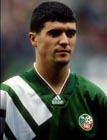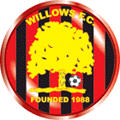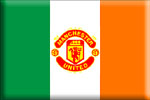Was Roy Keane Fully Committed to the Irish Soccer Team ?

During Roy Keane’s international career questions were regularly raised about his commitment to the Irish soccer team. As discussed elsewhere Keane, and by his own admission, was more committed to Cork than to Ireland. Of itself that does not necessarily mean that Keane was less than fully committed to Irish soccer. In Keano: Portrait of a Legend, the authors describe the most important thing to the “…deeply patriotic…” Keane was his call up to the Republic of Ireland.[Page 69]. The authors, Hildred and Ewbank, offer no evidence to support this assertion however and even a cursory examination of Keane’s autobiography, along with his appearance record for Ireland (appearance rate of only 42%), raises some questions about how patriotic Roy Keane really was.
Roy Keane Called up for Irish Under 15 Trials
In Roy Keane’s autobiography the first mention of the Irish team is when he states how important it was to him to be selected for the Irish Under 15’s. This was not because of the honour of representing his country but because “…you were in the shop window English club scouts.”[Page 9]. When Keane received word that he had been chosen by the FAI for the Irish Under 15 trials in Dublin he described his reaction as follows: “Your heart does leap! Well something happens, and it feels bloody marvellous.”[Page 9].
When Keane found out that he had not made the final trials for the Irish under-15’s his reaction was, “I was devastated. This was the worst disappointment of my life.”[Page 10]. He was devastated because a route to achieving his ambition of playing soccer in England had been closed off to him.
Keane suggests that perhaps he wasn’t picked because of a “…pro-Dublin bias for which the international selection committee was notorious…”. This doesn’t stand up to scrutiny because Keane was the only one of five Rockmount AFC players from Cork that was not selected for the final trials.
Roy Keane’s Football Priorities
Contrast Roy Keane’s his earlier sense of elation and devastation, described above, with how he reacted to being called into the Republic of Ireland Under 21 squad for a home match against Turkey: “I was pleased. Obviously it was an honour to play for my country, but to be honest, my primary concern at that time was my future at Forest.” [Page 35]. Now that he had achieved his ambition of playing for an English top flight football team – Nottingham Forest there was no ‘leaping heart’ this time.
It’s also instructive to note how Keane describes his reaction to winning his first senior international cap, against Chile. “I was pleased to be selected but it wasn’t a particularly memorable occasion.” [Page 49]. Most young Irish footballers would do anything to play for the Republic of Ireland senior team yet Roy Keane was simply “pleased”.
Keane Prepared to Never Play for Ireland Again
Even before he signed for Nottingham Forest he was, at best, ambivalent about the Irish national soccer team. He described himself as “…a fan of kinds…”[Page 76]. By 1991 any sense of ambivalence had disappeared. Roy Keane had no qualms about walking away from his international career. Jack Charlton had called up Roy Keane for the first time to the Republic of Ireland squad.
In his autobiography Keane [Page 40] suggests that Brian Clough would not let him join up with the squad because Nottingham Forest were due to play Barnsley, from the old second division, in a Zenith Data Systems Cup. This tie was scheduled to be played seven days before the international match. (The circumstances surrounding Roy Keane and the Zenith Data Systems Cup tie are dealt with in more detail elsewhere).
When told that Jack Charlton had said that he would never play for the Irish team if he did not join the squad, his reaction was, “It didn’t take thirty seconds to work out what to do. If that’s the way it is…so be it.” [Page 40]. At the tender age of nineteen years old was unconcerned that he might never to play for his country.
Roy Keane Gets an Opportunity to Play in the World Cup
Clearly Jack Charlton relented on his threat and Keane did go on to play for his country but Keane’s desire to play for Ireland was no more acute than before. With a very real possibility of qualifying for the 1994 World Cup Finals “…Ireland had three more World cup qualifiers – away to Albania, Latvia and Lithuania. However…I was more concerned about the next stage of my club career than with my international obligations.”[Page 77] Even when Ireland did finally qualify for the World Cup Finals in the USA Keane remained underwhelmed. “We were through to USA ’94. I was pleased, of course…but as the champagne flowed…I felt slightly detached from the mood around me.”[Page 103]. Compare this with Keane’s comment later in relation to the hotel the Irish squad stayed in during the 1994 World Cup; “The hotel wasn’t the best, but…I would have slept on the street to play in the World Cup finals.”[Page 121].
There is a stark contrast between just being “pleased” and being willing to sleep in the street. The apparent anomaly in Keane’s views is perhaps clarified by the follow-on comment; “You want to test yourself against the best and in 1994 that meant playing in this tournament.” This is more about Roy Keane, the individual, than the Republic of Ireland, the team, and its’ fans.
Fifty Irish Caps Mean Nothing to Keane
It is also clear that amassing international caps never had any significance to Roy Keane. At a press conference on the eve of winning his 50th international cap for the Republic of Ireland Keane was asked by a journalist what this meant to him. Keane’s reply was “Absolutely nothing”. This is borne out by the fact that Keane actively avoided playing Irish matches that he deemed unimportant. From November 1994 to June 2002 Keane only played in seven out of a possible 28 non-Euro and Non-World Cup matches. Two of the seven friendlies that he did play in were in the build up to the 2002 World Cup Finals.
Roy Keane Misses Second Leg Play-off Against Iran
In the 2002 World Cup play-off match against Iran at Lansdowne Road (now renamed the Aviva Stadium) on 10 November 2001 Roy Keane played for the Republic of Ireland in what was his first match in three and a half weeks. He was returning to action after recovering from a knee injury.
Ireland won 2-0. The away leg was due to be played five days later in Tehran. In his World Cup Diary Mick McCarthy says that he spoke to Keane shortly after the match about his knee [Page 100]. Keane assured McCarthy and physio Mick Byrne that his knee was fine and that he would travel to Tehran.
The next day Keane announced that his knee had reacted badly overnight and that he was heading back to Manchester. He would not make it for the away leg. Ireland lost in Iran 1-0 on Thursday 15 November. Roy Keane played for the full 90 minutes in a routine 2-0 win over Leicester City at Old Trafford just two days later.
Keane’s comments about about the second leg in Iran during his Saipan interview with Paul Kimmage is instructive.
|
Paul Kimmage: Did you watch the second leg in Iran on TV? Roy Keane: Yeah. At home. I was flicking. Paul Kimmage: You were flicking? Roy Keane: Yeah. Paul Kimmage: Why? Roy Keane: Because it wasn’t a great game. It was pretty dire. Paul Kimmage: And when we qualified? Roy Keane: It was no big deal. I felt we qualified on the Saturday before. Paul Kimmage: So there was no sense of elation? Roy Keane: No. I remember in ’94 going bloody berserk and I remember all the scenes but this was completely different. I think as you get older you accept it. |
Niall Quinn’s Efforts to Get Roy Keane Back into the Irish World Cup Squad
Following promptings from fellow Irish international, David Connolly, Niall Quinn used the fact that Quinn, Connolly and Roy Keane all shared the same advisor – Michael Kennedy – to try to get Keane back into the Irish World Cup squad. Quinn used Kennedy as a back-channel to get information and messages to Keane. On the back of numerous phone calls between Kennedy and Quinn, and intense negotiations with the Irish football manager, Mick McCarthy and the rest of the Irish players, the scene was set for a return for Keane. The wishes of the players allied to the public clamour from a large section of the Irish public persuaded Mick McCarthy to swallow his pride and he agreed to accept Keane’s return to the Irish World Cup squad. “I still have no desire to work with Roy Keane again in this World Cup but if he apologises, I realise that is something I will have to consider. If the Irish people want him back, I have to accept their wishes.”[Mick McCarthy: Ireland’s World Cup 2002 – Page 210]
The scene was set for his return and Roy Keane was fully aware of what he had to do. Mick McCarthy, the players, FAI, and his trusted advisor Michael Kennedy had worked hard and made compromises. All Keane had to do was make a short phone call to the Irish manager and offer a simple apology. But the call never came. If Roy Keane was really so committed to playing for the Republic of Ireland the opportunity was there despite his appalling tirade directed against his manager. But as Quinn, who worked tirelessly to rebuild a bridge between Keane and McCarthy said in his autobiography, mistakes had been made, ” … but only the smallest movement was necessary to put them right – one hard swallow, one short call. We all talk about how we’d do anything to play for our country, for the honour, the privilege and the glory, how we’d die for the green jersey. Well we wouldn’t, not all of us. We know that now.”[Page 175]
Roy Keane’s Attitude to the Thierry Henry Hand Ball Incident
On 18 November 2009 Ireland lost a 2010 World Cup play-off tie against France in very controversial circumstances. The French captain Thierry Henry handled the ball, not once but twice, before he crossed for William Gallas to score in extra time. The double hand ball was captured very vividly by the TV cameras but was completely missed by the referee and the other match officials. The Irish players were outraged and protested vehemently but to no avail. They were clearly distraught at the end of the match especially as the team had performed with great skill, courage and commitment, and deserved to win the match.
While almost every Irish supporter was incensed by the blatant hand ball by Henry and rallied behind the Irish team, Roy Keane refused to join the almost unanimous clamour by Irish supporters for a replay. He expressed his views on the incident at his weekly Ipswich Town FC manager’s press conference on the Friday following the match in the Stade de France on the previos Wednesday.
| “What goes around comes around. Ireland had their chances in the two games (against France), and they never took them, but it’s the usual FAI reaction ‘we’ve been robbed, the honesty of the game…’ There was one match against Georgia where Ireland got a penalty and it was one of the worst decisions I’ve ever seen which changed the whole course of the game. I don’t remember the FAI after the game saying we should give them a replay. I’d be more annoyed with my defenders and my goalkeeper than Thierry Henry, how can you let the ball bounce in your six-yard box? How can you let Thierry Henry get goal-side of you? If the ball goes into the six-yard box, where the hell is my goalkeeper?” |
The latter comments were directed at Irish defender, Paul McShane and goalkeeper Shay Given. Keane has expressed unfavourable comments about both players in the past. His comments, particularly about Given, were strange especially as the Donegal man was probably Ireland’s best player throughout the entire 2010 World Cup qualification campaign. Asked whether he had sympathy for Ireland’s players he said: “No. Not one bit.”
Keane then proceeded to take a shot at FAI Chief Executive, John Delaney, including an allegation that Delaney (who wasn’t the Chief Executive at the time) had never bothered to contact him (Roy Keane) during the Saipan incident which occurred over seven years earlier. Somewhat ironically he finished up by telling the Irish to “Get over it” less than 48 hours after the Irish team had been dumped out of the 2010 World Cup in a wholly dishonest and cruel manner.
Contrast With Mick McCarthy’s Commitment to Ireland
Roy Keane’s patently obvious antipathy towards the Republic of Ireland set up and the apparent willingness to pass up opportunities to play for his country was in stark contrast to Mick McCarthy’s commitment to Ireland.
When McCarthy was unexpectedly called up for his first international cap in a friendly match against Poland in May 1984 it clashed with his brother’s wedding. McCarthy was due to be the best man. Ireland already had three excellent centre-halves, David O’Leary, Mark Lawrenson and Kevin Moran so McCarthy’s chances of nailing down an international spot were slim. Despite this, McCarthy’s desire to play his country was so strong that he chose to play for Ireland in a meaningless end-of-season friendly rather than be best man at his brother’s wedding.
Another example of McCarthy’s commitment to Ireland occurred during the 2002 World Cup qualifying campaign. Irish manager McCarthy was away on a two match trip to Cyprus and Andorra. Halfway through the trip the Irish manager’s father, Charlie McCarthy, passed away. Charlie McCarthy had been ill for some time and both father and son knew that time was short. They had discussed the international trip the last time they were together. It had been one of his father’s last wishes, that no matter what happened, Mick would stay with the Irish soccer squad. McCarthy stayed with his team.
Conclusion
By his own admission the only aspect of playing for Ireland that Roy Keane enjoyed was “…the ninety minutes of football when match days came, but the rest left me cold.”[Page 100]. Whether this stems from the fact that he blamed the FAI for his delayed breakthrough into English football; or his distaste for the way Jack Charlton and Maurice Setters prepared for international matches; or Charlton’s style of play; or his obvious dislike of Mick McCarthy; or a combination of the lot, it is abundantly clear that playing for the Irish soccer team was just not very important to Roy Keane despite his repeated assertions to the contrary.
NOTE: Unless stated otherwise all quotations are from:
Keane: The Autobiography; Roy Keane with Eamon Dunphy (2002); Michael Joseph Ltd
Roy Keane & Jack Charlton
Back to Saipan Affair Table of Contents – Irish Football
© 2009-2018 Soccer-Ireland.com. All rights reserved
All rights reserved. No part of this website may be reproduced, stored in or introduced into a retrieval system, or transmitted, in any form or by any means without prior written permission. No permission will be withheld to any reasonable requests.
Please contact Soccer-Ireland.com
| Saipan Table of Contents | Roy Keane & Eamon Dunphy |
| Saipan Introduction | Roy Keane & Cork |
| Methodology | Keane’s Aversion to Being Away From Home |
| Saipan Conclusions | Roy Keane’s Relationship with Ireland |
| Roy Keane – Mick McCarthy Relationship | Roy Keane – Zenith Data Systems Cup |
| Roy Keane Version of Saipan Incident | Roy Keane – Jack Charlton Relationship |
| Mick McCarthy Version of Saipan Incident 1 | Roy Keane’s Flawed Character |
| Mick McCarthy Account of Saipan Incident 2 | Roy Keane’s Good Character |
| Niall Quinn Version of Saipan Incident | Roy Keane – Footballer |
| Jason McAteer Version of Saipan Incident | Roy Keane – Team Captain |
| Matt Holland Version of Saipan Incident | Roy Keane – Family Man |
| Roy Keane & Saipan – The Backdrop | Roy Keane & Faking Injury |
| Roy Keane & Saipan – The Issues | Roy Keane – Bad Boy |
| Keane / McCarthy Boston Row 1992 | Roy Keane – Career Lows |
| Keane Misses Iran Playoff Game | Roy Keane – Red Cards |
| Keane Misses Niall Quinn Testimonial | Roy Keane – Cruciate Injury |
| Countdown to Saipan Incident | Roy Keane & Alf-Inge Haaland |
| Roy Keane Saipan Tirade at Mick McCarthy | Roy Keane & Gareth Southgate Red Card |
| Roy Keane / Tom Humphries Saipan Interview 1 | Roy Keane & Alan Shearer Red Card |
| Keane / Humphries Saipan Interview 2 | Roy Keane / Alex Ferguson Relationship 1 |
| Roy Keane / Irish Times Saipan Interview 3 | Roy Keane & Sir Alex Ferguson 2 |
| Roy Keane / Paul Kimmage Saipan Interview 1 | Roy Keane & Charity |
| Keane / Kimmage Saipan Interview 2 | Roy Keane & Autobiography Contradictions |
| Roy Keane / Sunday Independent Saipan Interview 3 | Roy Keane & Contradictions |
| Roy Keane / Tommie Gorman Interview 1 | Roy Keane – Integrity |
| Roy Keane / Tommy Gorman Interview 2 | Roy Keane – International Matches |
| Roy Keane / RTE Interview 3 | Roy Keane – Football Record |
| FAI Involvement in Saipan Affair | Roy Keane & Sandwiches |
| Saipan Reaction of Irish Players | Roy Keane – Walker |
| Mick McCarthy – ‘crap player, crap manager’ | Saipan – Pacific Island |
| Roy Keane / Mick McCarthy Playing Record | I Keano – The Musical |
| Colin Healy – Forgotten Man of Saipan | Roy Keane – Football Manager |
| Saipan Ten Years Later | Roy Keane’s Dog Triggs |
| Roy Keane’s Autobiography | Saipan Bibiliography |
|
Roy Keane – View Seven Years After Saipan
|
Football Quotes on Saipan
|
Ireland at 2002 World Cup Finals – Irish 2002 World Cup Squad – Irish Group Matches
Ireland V Cameroon – Ireland V Germany – Ireland V Saudi Arabia – Ireland V Spain





